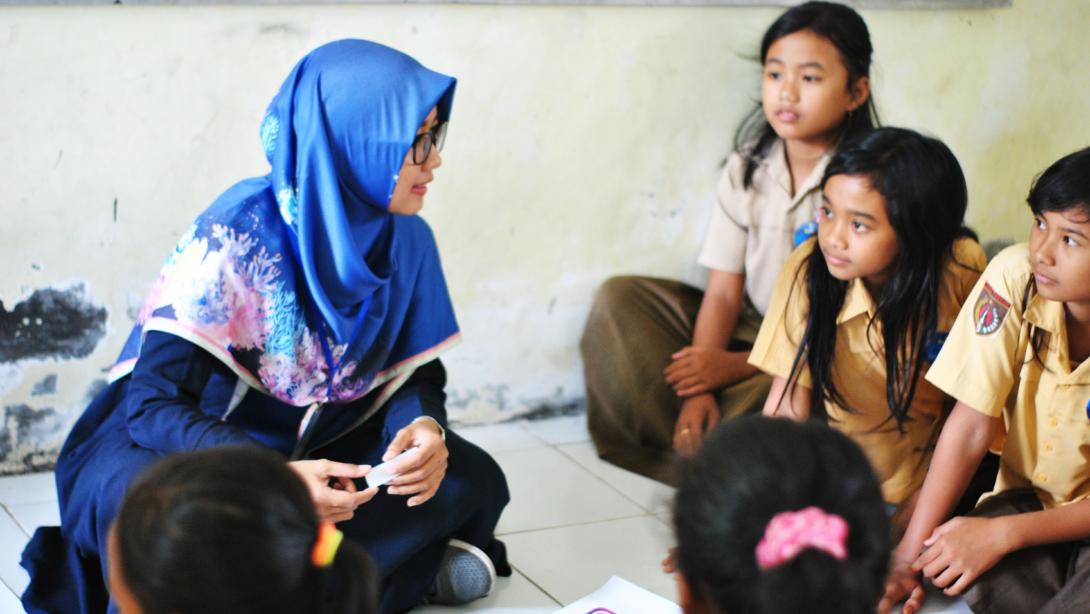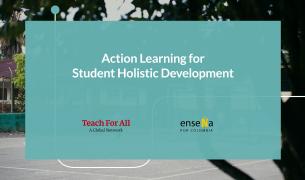Teacher wellbeing is no longer “nice-to-have”

5 lessons from around the world on fostering teacher wellbeing
Over the past few years, the world has witnessed the incredible contribution of teachers as they have navigated numerous challenges: unexpectedly shifting to online learning, supporting students through the pandemic and wars and dealing with so many other daily stressors. Yet, many teachers are facing burnout, making it increasingly hard to retain and attract talented people to the profession. Even those teachers who choose to stay often find themselves in stressed states, unable to perform at their best.
Across Teach For All’s global network, spanning over 60 countries, we believe that placing attention on teacher wellbeing matters. Here are five things that we are learning:
- Reframe the narrative
For too long, in frontline professions like teaching, self-sacrifice has been normalized, whereas self-care has been seen as indulgent. It’s time for us to flip the narrative.
We know intuitively that a teacher’s state of “being” affects students, but there have been some recent advances in neuroscience and research that now validate the impact of this cycle. Science shows us that a student may mirror the emotional state of a teacher. This means that a calm teacher can inspire calm in her students, whereas a stressed teacher can pass on stress to students.
Brain science also shows us that when students are in stressed states, it not only affects their wellbeing but also inhibits the executive centers of their brains responsible for higher order cognitive thinking, thereby affecting their ability to learn. So, if we’re concerned about student wellbeing and learning, we need to reframe teacher wellbeing not as a nice-to-have, but as a must-have. - Listen deeply to teachers and engage with them in co-creating solutions
When we ask teachers and those who support them what can further enable teacher wellbeing, we consistently hear: “Listen to teachers!” When teachers are facing adversity, it’s important that it is acknowledged. It’s not that they can’t handle the stress of the job. They want to feel understood. They want to feel less alone. The simple act of “being heard” or having one’s emotions and realities validated can in itself alleviate a great deal of pressure.
Listening deeply to teachers can also result in a more nuanced understanding of the challenges they’re facing, leading to creative solutions. For example, Teach For Lebanon found that teachers were experiencing a great deal of stress simply commuting to schools and accessing basic supplies due to the country’s fuel and economic crisis. In hearing these needs, they came together and set up a transport reimbursement system for those travelling long distances, as well as access to stationery and phone cards. Oftentimes, small steps can make a big difference.
Of course, not all challenges have simple solutions. Teachers may also raise more systemic concerns — for example, challenges with administrative burdens or low pay — that they cannot solve alone. These types of challenges require the collective leadership of many people in the system (e.g., teachers, school leaders, policymakers) . This provides even more reason for all of us to upskill our capacities in attentive listening and working across lines of difference, so that we can come together to solve these more complex challenges. - Acknowledge trauma and create space for healing
Teachers and students today are facing a great deal of trauma, driven by ongoing crises such as wars, pandemics, lack of access to food, violence, discrimination, bullying, and so many other pressures. While many teachers are bringing trauma-informed teaching practices to their classrooms to support students, we have also seen the value in creating spaces for teachers to do this healing work for themselves.
For example, Teach For Nigeria recently trained all their teachers in trauma-informed practices. Teachers were invited to map the systems around each of their students to notice what factors in a student’s life, or in the system around them, might be inhibiting their wellbeing and learning. Before conducting this exercise, teachers were invited to complete the system maps for themselves. In looking at their own lives, many teachers had deeply transformative experiences, recognizing that investing in their own healing was a necessary first step if they wished to create healing spaces for their students. - Invest in holistic support networks
The research shows us that if teachers have strong support systems — even just one to two strong relationships in a school — it can make a huge difference in their sense of wellbeing. What’s even more powerful is developing a broad and holistic network of support around teachers. As one example, Ako Mātātupu (Teach First New Zealand) has created a whole community of care around teachers to support their wellbeing, grounded in indigenous practices that are relationship-centerd and prioritize holistic care. Teachers have access to a range of support, from kaihāpai (teacher coaches) who provide academic support and pastoral care, to a professional therapist who is grounded in the organization’s values. Their focus is on the wellbeing of the whole person, ensuring that all aspects of a teacher’s human experience — their culture, their family life, their identity — are fully valued.
It’s not just support networks at the local level that matter. As we’ve been developing a Global Mental Health and Wellbeing Community for teachers and other leaders across our network, we’re hearing equally powerful reflections from them about the value of peer support across borders. At almost every gathering, a common sentiment expressed by community members is a feeling of relief that “I am not alone in this,” which is often accompanied by a renewed sense of possibility about taking on the challenges that they face. - Support teachers to do the “inner work” and stay connected to purpose
The hard reality is that teachers will continue to face many challenges and uncertainties . While we must continue to collectively tackle systemic issues, we also need to support teachers to cultivate the “inner” skills and mindsets to navigate these rocky waters.
Across our network, we are now seeing many Teach For All partner organizations explicitly building teacher training curricula that focus on skills like resilience, mindfulness, and managing one’s emotions and energy. For example, Teach For Malaysia has built a teacher wellbeing playbook to support teachers in growing skills in a range of practices that foster wellbeing — from cognitive behavioral practices for naming emotions and disrupting negative thought patterns, to physical practices such as mindful breathing that enable teachers to pause during stressful moments. Enseña por México has also created a holistic wellbeing curriculum for its teachers, with regular sessions on topics such as self-compassion and building healthy relationships. Teachers, in turn, are now cultivating these socio-emotional skills in their students.
We’re also learning that wellbeing is deeply intertwined with one’s sense of meaning and purpose in life. When teachers feel connected to their deeper purpose, especially when they can directly see the impact they’re having on students’ lives, this often gives them the fuel they need to sustain themselves through difficult times. However, it’s not always easy to stay centered on one’s purpose when the daily struggles of the job feel so overwhelming. To support teachers to stay connected to their sense of purpose, even under chaotic conditions, Teach For Armenia encourages teachers to do a regular journaling practice to maintain a bigger-picture perspective, and also pairs them with coaches who help them reframe daily struggles within the context of their deeper “why”.
Teachers play one of the most important roles in our societies, as they are responsible for activating the full potential and humanity of our next generation. We must value these incredible teachers by supporting them to be well while they pursue this noble work. And especially, if we wish for a world where all young people are well and thriving, we must take care of our teachers first.
This piece was originally published by the OECD Forum


